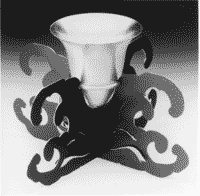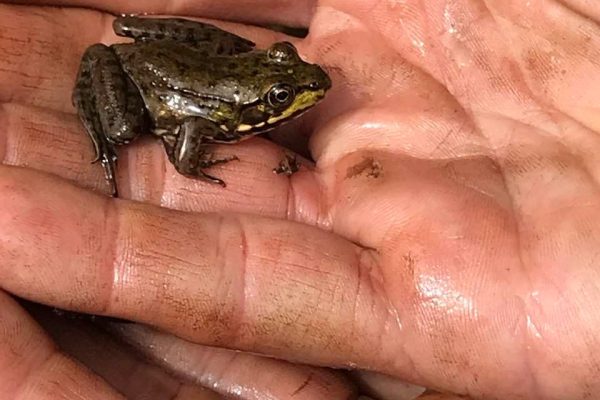
What is a Miriam’s Cup?
A Miriam’s Cup is a new ritual object that is placed on the seder table beside the Cup of Elijah. Miriam’s Cup is filled with water. It serves as a symbol of Miriam’s Well, which was the source of water for the Israelites in the desert. Putting a Miriam’s Cup on your table is a way of making your seder more inclusive. It lets people know that at your table, the words of girls and boys, women and men, are welcome. It is also a way of drawing attention to the importance of Miriam and the other women of the Exodus story – women who have sometimes been overlooked but about whom our tradition says, “If it wasn’t for the righteousness of women of that generation we would not have been redeemed from Egypt” (Babylonian Talmud, Sotah 9b).
There are many legends about Miriam’s Well. It is said to have been a magical source of water that followed the Israelites for forty years because of the merit of Miriam. The waters of this well were said to be healing and sustaining. Thus Miriam’s Cup is a symbol of all that sustains us through our own journeys, while Elijah’s Cup is a symbol of a future Messianic time.
When and how to use your Miriam’s Cup?
As Miriam’s Cup is still a new addition to the seder, its use is not fixed. Some fill Miriam’s Cup at the very beginning of the seder. Miriam, after all, appears at the very beginning of the Exodus story (watching over her brother Moses in the Nile). Starting with Miriam’s Cup is also a way of letting people know right from the beginning that your seder is going to be a fully inclusive one. Also, since Elijah’s Cup comes at the end of the seder, it is nice to use the two cups as a frame for your seder and begin with Miriam.
Others fill or raise Miriam’s cup after the recitation of the Ten Plagues and before dayyenu, which carries the story of the Exodus through the crossing of the Red Sea and into the wilderness, moments during which Miriam played an important role. Others use Miriam’s Cup along with Elijah’s Cup towards the close of the seder, with Elijah representing the herald of the messiah, and Miriam, a prophet urging us to do the work to bring about redemption. Another suggestion is to close the seder by passing around Miriam’s Cup for every one to take a drink, and commit to carrying the seder’s themes with them beyond the night of the seder. Feel free to use anyone or any combination of these ideas for incorporating Miriam’s Cup into your seder.
You can either fill your Miriam’s Cup with water from a pitcher, or you can invite everyone at the table to pour some water from their drinking glasses into Miriam’s Cup. Everyone contributing water emphasizes that we each have a role in reviving the stories of women and in sustaining the Jewish people on our journey.
There is no set blessing over Miriam’s Cup but you might want to use the following declaration:
.זֹאת כּוֹס מִרְיָם, כּוֹס מַיִם חַיִּים. זֵכֶר לִיצִיאַת מִצְרָיִם
Zot Kos Miryam, kos mayim chayim. Zeicher l’tzi-at Mitztrayim.
This is the Cup of Miriam, the cup of living waters. Let us remember the Exodus from Egypt. These are the living waters, God’s gift to Miriam, which gave new life to Israel as we struggled with ourselves in the wilderness.
Blessed are You God, Who brings us from the narrows into the wilderness, sustains us with endless possibilities, and enables us to reach a new place.
“Miriam’s Cup blessing” Copyright 1996 (Matia Rania Angelou, Janet Berkenfield, Stephanie Loo). Kol Ishah, PO Box 132, Wayland, MA, 01778










